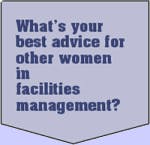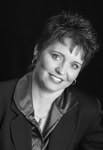Women in Facilities Management
Though still greatly outnumbered, more women today than ever before are joining the ranks of facilities professionals, acting as leaders and helping guide the future of this business. Hailing from different backgrounds and equipped with varying skill sets, women established in and entering facilities management are changing the face of the industry.
As the bulk of the workforce ages into retirement, many facilities professionals are near (or at) the ends of their careers. As the number of women in commercial real estate continues to increase, more women are taking over for male facilities professionals. According to the groundbreaking 2005 study by the Lawrence, KS-based Commercial Real Estate Women (CREW) Network, over the past 7 years, the percentage of female professionals in the industry increased from 32 percent to more than 36 percent. While this figure includes women in development, brokerage, law, financing, and other professions within commercial real estate, the number of women in facilities management is definitely on the rise as well. According to information provided by the Houston-based Intl. Facility Management Association (IFMA), the overall percentage of women in facilities management is approximately 24 percent.
Lending their insight on what it's like to be a woman working in a veritable sea of men, four Buildings subscribers spoke about their careers in facilities management and offered their advice for other women stepping onto the facilities field.
The Paths They're Taking
While many of the women in this industry have taken the direct route, knowing they wanted a career in commercial facilities, others have followed a winding path to get to their current positions (like these four women). For instance, the path that 12-year veteran Emily Hewitt, currently the facilities manager for Thomson Tax & Accounting in Dexter, MI, took was literally winding: She was the facility manager for a train moving around the country for a few years before she arrived at her current position. With a bachelor's degree in an unrelated field, Hewitt feels the skills needed to be successful in facilities management aren't necessarily taught in a classroom.
"In our field, good problem-solving and communication skills are really the key," she says. Hewitt acknowledges that some women in facilities professions start in administrative positions (like she did). "They worked in the office, and then they were needed to do all these other things, and it took over, and now they're the office manager ... and then they're going down the facilities side," she says.
While some people may view such a background as "pink collar," Stephanie Gillispie, who started her career in facilities precisely that way about 8 years ago, would disagree. "As an admin assistant, I met the contractors and vendors, and needed to be aware of what was going on in the facilities," says Gillispie, the facilities manager for The Council of State Governments in Lexington, KY. "A lot of the admin role flowed into the facilities role," she says. "I was able to just phase into the position as my supervisor retired." Her educational background was computer science, but Gillispie found her fit in a position that used her administrative skills and challenged her to gain new ones.
"Be discerning. Use your life experience and personality to prove yourself."
"Take one day a week and follow your crew. Work directly with them and see what's involved. It's very important to know the amount of time that tasks take so you don't overburden them."
"Don't hesitate to ask questions" and "know what the trends are."
"Learn as much as you can."
Jillian Del Pozo gets to exercise the full range of her talents as director of facilities and operations at Stanford Law School in Stanford, CA. From designing and planning office spaces to serving as administrative manager and then facility manager at a national law firm - and finally to facilities and operations director - her experiences over the past 20 years in the industry have given her a broad skill set that she puts to good use. Her responsibilities don't end with systems maintenance and furniture selection. "I'm on campus committees, I participate in capital planning," lists Del Pozo. "This job has really grown."
Sherrie Berry's journey to facilities manager for St. John Lutheran Church in Ellisville, MO, began 25 years ago in commercial property management. "I started out managing apartment communities when I was just out of college," says Berry. Her last position, with a large real estate company, required an intense amount of work and travel that cut into family time. Berry jumped at the opportunity to apply when the facilities position at St. John opened up; nine men and Berry applied. "At first," she says, "I think people thought that a man should have been hired. I don't think it was comfortable for them." Her approach to the facilities realm, however, soon dispelled any qualms. "It's totally changed," she says. "I think they respect me now because they know I have a lot of information, and I'm not afraid to say ‘I don't know' and ask for help."
The Skills They Bring
Many women in facilities management use their inherent relational skills and intuition to make themselves better at their jobs. "We're perfect for this job," says Berry. "Women are built for this job. We're smart, and we do have an emotional side that is important in business, too." Berry's choice to be candid about her strengths and weaknesses with her employees displays what Hewitt finds as the key to success as a woman in facilities management. "A lot of it is personality," says Hewitt. "I think it's how you present yourself, what your reaction is to a slight, and how confident you are ... at the end of the day, you have to prove yourself in your environment."
Gillispie proves herself and her skills by being a hands-on manager with her staff of seven. "I'm very involved," she says, "and keep them aware of the goals we're working toward. I'm not afraid to do anything that I ask them to do, whether it's plumbing, painting ... I may not know a lot about it, but I'll get in and learn it." Likewise, Del Pozo says, "I know enough about plumbing, electrical, and HVAC to be dangerous now," commenting on her habit of letting the contractors she works with educate her in areas that aren't her forte.
The Education They Pursue
Education, through experience or otherwise, is important to all these women. Del Pozo stressed the importance of reading to stay on top of the facilities industry. "If you could take 20 minutes a day and read the trade journals, and catch up on what's happening ... you can find out what the trends are so you can quickly do course correction in your facilities or in planning for the future," she says. "You need to know what's going on so you aren't blindsided and can't catch up."
Berry agrees: "Just learn as much as you can," she says. "The more information you have and the more expertise you get, people see that and start going, ‘Wow.' " Berry also stresses the importance of continuing education, saying, "Go to seminars and learn and bring things back. You need to know a little bit about everything in this job." She also mentions that women thinking about entering facilities management should strive for higher education in the field, saying, "Getting a degree would be a tremendous help."
The Problems They Face
No amount of education can help with some of the problems faced by women in facilities management. On the go all the time, many female facility managers with families or children feel the tension between work and home (as do many men in the industry). Gillispie has arranged her office so that, if her children are sick and she needs to work, they can come to her office and watch TV or do homework. "Facilities is a 24/7 job - you never walk away from it," says Gillispie, who takes only very short vacations so she doesn't get behind at work. "I'll call my guys even when I'm out of town, two or three times a day, just to see what's going on and if there are any problems," she says. "I've kind of made it my life. It's kind of one of my children as well."
Hewitt is nonchalant about the home/work balance for facilities managers. "It's a way of life," she says, "that you either embrace or you don't." Del Pozo also acknowledges the demanding nature of the job, but has relaxed her hold as her experience increases. "When I first got here and didn't really have a staff, I hit the ground running," she says, "but since I've been able to increase and train my staff ... for the very first time, I took a 3-week vacation and had no qualms about things getting done."
Other, more subtle difficulties having to do with being a woman in facilities management still exist, though the women interviewed all noted with absolute confidence that the political environment of facilities management has been (and is) constantly improving. "You can jump in and do the job just like anyone else," says Gillispie, "but getting your contractors and vendors to accept and respect you is your biggest challenge." Gillispie and the others agree that cultivating a good relationship with contractors and vendors is vital to being taken seriously.
The Future They Look Forward To
Though they still feel the need to prove themselves more than men do, things are changing. "I've definitely seen a change over the last 5 to 8 years," says Del Pozo, who hasn't had a problem with vendors/contractors based on her gender in more than a decade. Gillispie and Hewitt both mention a "positive change" in the industry, and Berry nails it down: "I think men are starting to know it's great to work for a woman."
As more women enter the field, the chances are strong that they could be mentored or recruited by soon-to-retire male facility managers. According to the 2007 CREW study, Minding the Gap, cross-gender mentoring is one of the best ways to promote parity and level the playing field for both men and women in commercial real estate. Despite the difficulties associated with facilities management in general, these women truly find satisfaction in their work. "My job is very, very diverse," says Del Pozo, thinking of all her upcoming facilities projects, as well as the day-to-day issues that arise, "and that's what makes it fun."
Jenna M. Aker ([email protected]) is new products editor at Buildings magazine.





